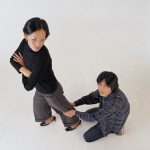Codependency in LGBT Relationships
It’s no secret that those of us in LGBT relationships tend to have strong emotional attachments with our partners, particularly long-term partners. While this can be a wonderful experience in a relationship with healthy boundaries between “self” and “other”, strong emotional attachments can become maddening when codependency is an issue.
Anyone who has spent any time in the LGBT community may have heard comments like: “Lesbians never break up.” and “Gay men never let go.” While this has been a widely accepted idea often used to stereotype our relationships as dysfunctional, research is showing that there is some truth to these statements. Specifically; that women in same-sex relationships tend to remain connected and intertwined in each others lives long after break-up.
[caption id="attachment_81" align="alignleft" width="150" caption="What Codependency? "] [/caption]
[/caption]
Now, I don’t necessarily consider this to be a bad thing. I think women are naturally communal and are masters at creating families of choice, traits that may save our lives at some point or another. As a lesbian woman with children who has dated other lesbian women with children, I can testify that letting go is not always easy, especially when your children were playmates and you’ve become a part of their family or they have become a part of yours.
Even when my relationships with these women didn’t work out, I remained connected to them simply because I was tired of people coming and going out of my life. I thought staying connected would ground me and give me my family of choice. I thought if I was good enough to others, others would “learn” to be good to me. In short, I, like many in the LGBT community had not resolved my abandonment issues.
What Does Codependency Look Like?
There are plenty of psycho clinical definitions for codependency. But when it’s all said and done, here are some examples of what a codependent relationship looks like:
- You give and give and give and no one is ever there when you need them.
- You make your relationship more important to you than YOU are to you.
- A one-sided relationship where one person is trying to make the relationship work with someone who is not.
- You are easily absorbed in the pain and problems of others.
- It’s not okay to talk about your problems or feelings. Keep them to yourself because talking only makes things worse and no one cares how you feel anyway.
- You don’t want to be selfish, so you put your needs last.
- You do more than your fair share most of the time.
- Be right. Be strong. Be good. Be perfect. Make THEM proud!
- You are obsessed with rescuing, fixing and controlling “needy” people.
- You would do ANYTHING to hold on to the relationship.
Does Codependency Have to End a Relationship?
It is my belief that every relationship, no matter how healthy, exhibits something that someone could call codependent. Keep in mind that these examples manifest in different ways and to different degrees. If you find that your relationship does have codependent elements, it’s not the end of the world. Relationships can be improved when BOTH partners are open, honest and committed to working through it.
You can also connect with Tanisha Neely on Twitter, Facebook and Google+ and Linkedin
APA Reference
tneely
(2013, January 17). Codependency in LGBT Relationships, HealthyPlace. Retrieved
on 2026, January 22 from https://www.healthyplace.com/blogs/thelifelgbt/2013/01/codependency-in-lgbt-relationships
Author: tneely
Thank you so much for writing an article that I was afraid to read! That told me I had to read it and it was good.
Tanisha, bravo! As a recovering codependent who grew up in a family without respectful boundaries, I don't think I've ever come across a better, to-the-point description of codependency than your list of examples. Not even in the book CODEPENDENT NO MORE, which changed my life.
I'm straight and agree that all relationships exhibit some aspects of codependency. After all, two people in love will naturally help each other with their problems. As you say, though, in a healthy relationship partners are open, honest and committed to finding solutions. They have respectful boundaries instead of the mess and chaos of codependency.
Thanks for the thought-provoking entry!